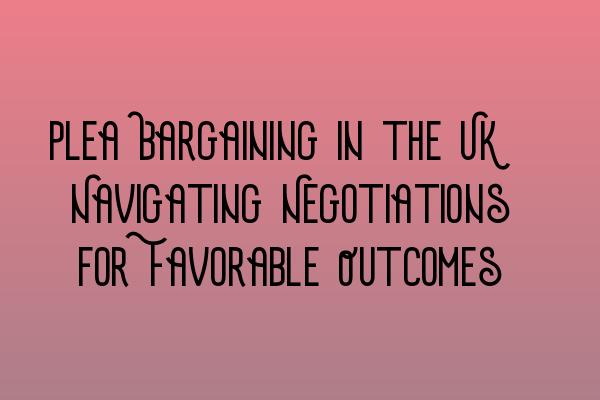Plea Bargaining in the UK: Navigating Negotiations for Favorable Outcomes
Plea bargaining is an essential aspect of criminal law in the UK. It involves negotiations between the prosecution and the defense, where the defendant agrees to plead guilty in exchange for certain concessions from the prosecution. These concessions may include reduced charges, lighter sentences, or the possibility of avoiding trial altogether.
Understanding the intricacies of plea bargaining can significantly impact the outcome of a criminal case. This article aims to provide a comprehensive overview of plea bargaining in the UK, offering insights on how to navigate negotiations for favorable outcomes.
The Benefits of Plea Bargaining
Plea bargaining offers several benefits for both defendants and the criminal justice system as a whole. For defendants, it presents an opportunity to secure a more favorable outcome compared to what may be obtained through trial. This can include a reduced sentence, avoiding a conviction for more serious charges, or even avoiding imprisonment altogether.
For the prosecution, plea bargaining saves resources by avoiding lengthy trials and reducing the burden on the courts. It allows them to focus their efforts on more serious cases and ensures that cases are resolved efficiently.
However, it’s crucial to note that plea bargaining is not suitable for every case or defendant. The decision to engage in plea negotiations should be made on a case-by-case basis, considering the specific circumstances and legal advice.
The Process of Plea Bargaining
The process of plea bargaining begins with the defendant’s legal team and the prosecution engaging in negotiations. The defense may seek to have charges dropped, reduced, or modified to secure a more favorable outcome for the defendant.
During these negotiations, it is essential to have a clear understanding of the evidence presented by the prosecution and its strengths and weaknesses. This knowledge allows the defense to negotiate strategically and make well-informed decisions.
It’s important to note that plea bargaining does not guarantee a certain outcome. The final decision lies with the judge, who will review the terms agreed upon by the prosecution and the defense. The judge will consider various factors, including the seriousness of the offense, the defendant’s criminal history, and the impact on victims, before making a final decision.
Factors to Consider in Plea Bargaining
Several factors should be taken into account during plea bargaining negotiations to achieve favorable outcomes:
- Evidence: The strength of the evidence presented by the prosecution can significantly impact the negotiations. Understanding the strengths and weaknesses of the evidence allows the defense to assess the likelihood of securing a favorable outcome.
- Legal Considerations: Familiarity with the relevant laws and precedents is crucial to determine the potential defenses available and the likelihood of success at trial.
- Sentencing Guidelines: Knowledge of the applicable sentencing guidelines can help frame the negotiations and assess the potential outcomes in terms of sentencing.
- Collateral Consequences: Considering the potential collateral consequences, such as the impact on employment, immigration status, or professional licenses, can guide the defense in negotiations.
The Role of the Solicitor in Plea Bargaining
A skilled solicitor plays a vital role in plea bargaining. They not only provide legal advice and guidance to the defendant but also negotiate on their behalf. Solicitors have extensive knowledge of criminal law, sentencing guidelines, and local court practices.
They leverage this knowledge to advocate for the best possible outcome for their clients. They analyze the evidence, identify weaknesses, and engage in effective negotiations with the prosecution. Their goal is to secure a plea agreement that aligns with the defendant’s interests and ensures the most favorable outcome.
Conclusion
Plea bargaining is a complex process with significant implications for both defendants and the criminal justice system. Navigating negotiations for favorable outcomes requires a thorough understanding of the legal landscape and the ability to leverage bargaining power effectively.
If you want to delve deeper into the legal aspects of contracts and negotiation strategies, consider reading our related articles:
